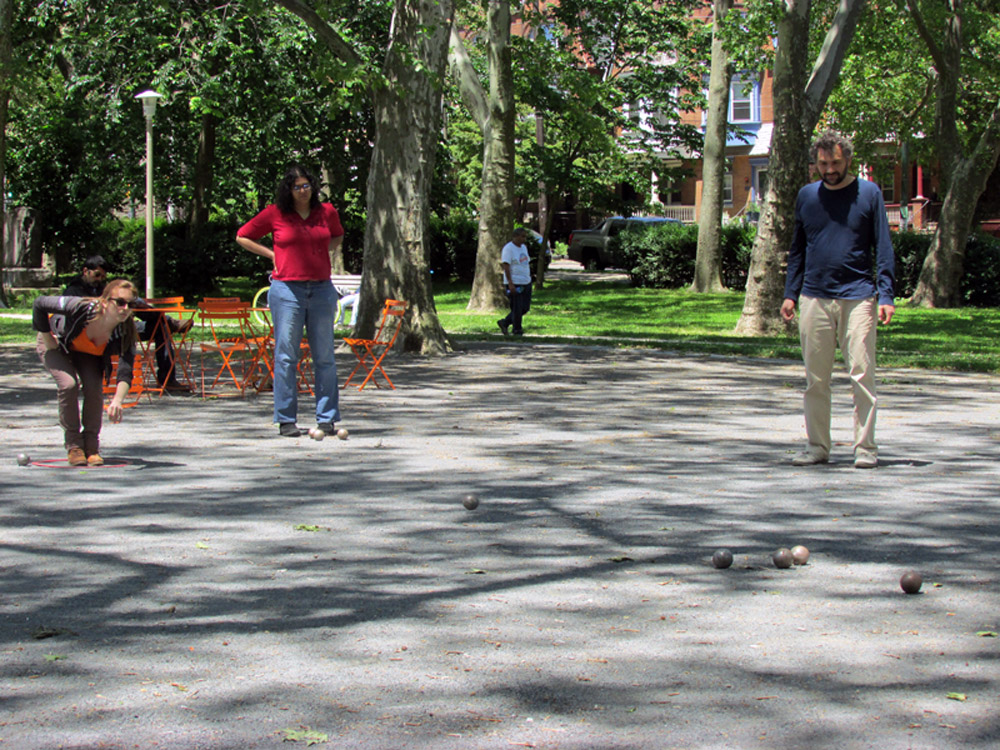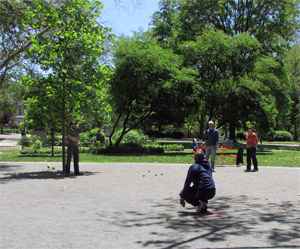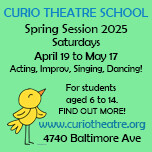Folks who’ve strolled through Clark Park’s north circle on Sunday are probably wondering why people were whipping and rolling around shiny orbs. Well, we have your answer: they’re playing pétanque.
Every Sunday, players from West Philly to as far as Harrisburg gather to try their hand at the French sport of “boules” (or “balls”) as members of the new Philadelphia Pétanque Meetup group, the first of its kind in the city. Originated in 1900s, pétanque (pronounced ‘pay-tonk’) is a teamed game in which players toss metal globes in hopes of landing it as close to the “cochonnet”—a smaller wooden ball—as possible. According to Bill Craig, one of the Meetup’s organizers, pétanque is a “growing phenomenon” at the park, with the group sometimes drawing nearly 20-30 athletes a game.
“Pétanque is a game that appeals to men and women, old and young, all races and ethnic backgrounds, [and] professional backgrounds,” said the 43-year-old architect who launched the Meetup with West Philly residents Delphine Dahan and Matt Pagett in December. “The game is a bridge of sorts that links a very wide variety of people who would otherwise probably not interact with each other.”
When West Philly Local stopped by Clark Park on May 26 to check out the game, we found a diverse clutch of 12 pétanque players sectioned into three games laughing and engaging in light-hearted repartee while focused keenly on their next move. The social banter—meets—competitive spirit is due in large part to the sport’s pace and close proximity, said Craig, allowing a “nice sense of friendship and community” to form.
“I haven’t really been able to pinpoint why, but pétanque has a beguiling ability to relieve stress and allow one to relax,” he said. “It seems to be the perfect combination of cerebral and physical, not excessively taxing in either way but sufficiently engaging and demanding to be consistently stimulating and enjoyable.”
According to Craig, the organizers hope to establish an official Philadelphia pétanque club in the near future, joining other large metropolises like New York, Austin and Portland—all of which have clubs listed as members of Federation of Pétanque U.S.A, the game’s official governing body. There are also plans in the works to host a weekend-long local pétanque tournament in the fall, said Craig.
Philadelphia Pétanque meets every Sunday at 11 a.m. in Clark Park’s north circle, and every Wednesday or Thursday evening at 6 p.m. on University of Pennsylvania’s campus at 40th and Walnut Streets. To join or RSVP for a game, visit https://www.philadelphiapetanque.com/.
– Annamarya Scaccia










June 4th, 2013 at 11:59 am
What makes this different than bocce?
June 4th, 2013 at 12:06 pm
was going to ask the same thing…
June 4th, 2013 at 3:11 pm
I was also wondering the same thing. After some Googling, it seems they’re the same game; the French call it Petanque while the Italians call it Bocce. I know it as Bocce. After looking at the Wikipedia Petanque rules, it certainly seems like they’re one and the same game, just different names.
June 4th, 2013 at 4:14 pm
There are definitely many similarities but important differences too. Pétanque is played using baseball-size metal balls that are thrown through the air and/or rolled on the ground whereas bocce is played using softball-size balls that are almost always only rolled. Pétanque is also played on more open and varied ground surfaces, rather than a well-manicured court with side walls. Come by and try and you will see (I think) that pétanque is a more dynamic and interesting game.
June 5th, 2013 at 3:44 pm
Petanque on the beach is awesome because you can use eroded sand castles and footprints and whatnot as obstacles. Very strategic game.
June 4th, 2013 at 12:49 pm
Do I have to wear a gaudy clown barf sweater if I play?
June 5th, 2013 at 12:17 am
I assume Wild Turkey is referring to the Cosby line of petanquewear, not currently mandated by the International Petanque Federation:
http://youtu.be/2tr3YtYmMDo
June 5th, 2013 at 10:08 am
There’s a great David Sedaris piece in which he plays petanque at a nudist colony.